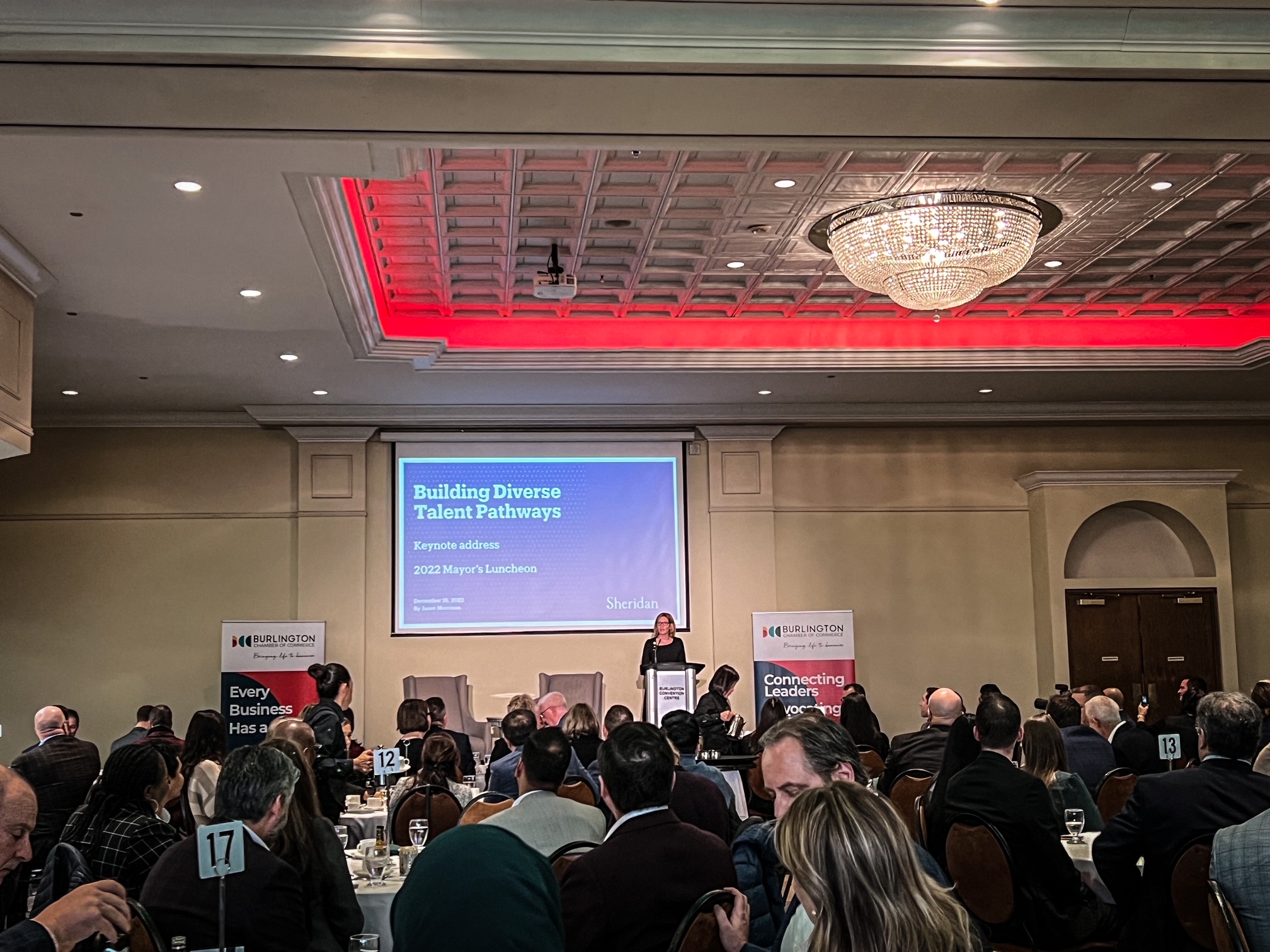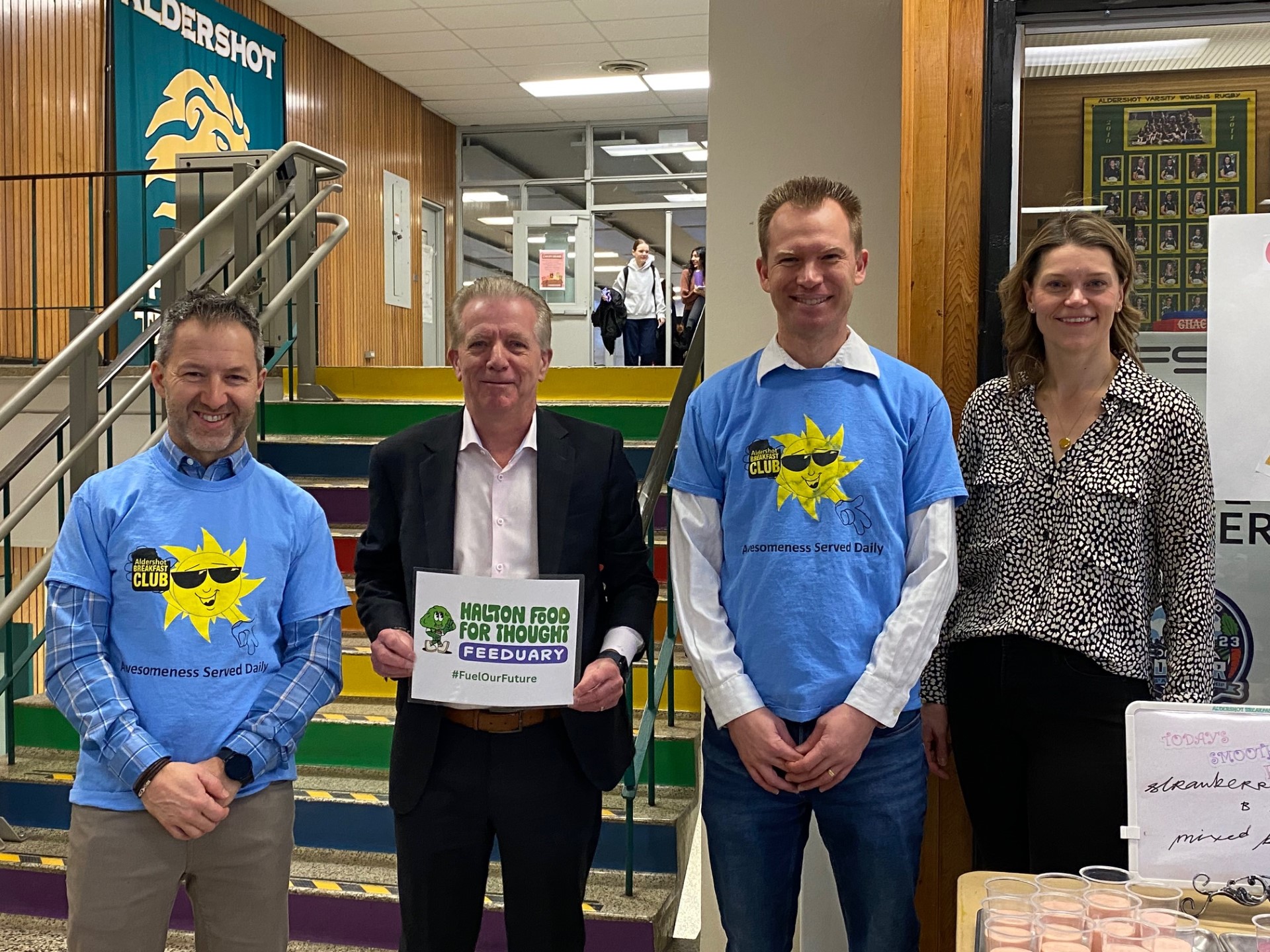“Diversity fuels excellence,” says Dr. Janet Morrison, the keynote speaker at last week’s Mayoral Luncheon held by the Burlington Chamber of Commerce. Morrison, president and vice chancellor of Sheridan College and former resident of Burlington, led a presentation that highlighted the importance of leading with a lens that encompasses equity, diversity, and inclusion.
Morrison’s presentation came following Mayor Marianne Meed Ward’s introductory remarks, which included her deep gratitude for her re-election, noting that only 18% of mayors across the country are women. Meed Ward also acknowledged that there are areas of improvement that require attention, and these include speeding up the permit approvals for development applications. Delaying permit approvals have proven to be detrimental, from both a housing supply perspective, and tax revenue opportunities for the city. According to the mayor, there are currently 21,000 units of housing in review, and under Bill 23, the More Homes Built Faster Act, the city has been assigned 29,000 units. Considering these figures, the gap appears to be narrowing, which can be viewed in a positive light if the city is able to effectively collaborate and prioritize expediting any associated delays.
Meed Ward expressed interest in continuing all the initiatives that were started during the last term of council, including any foundational master plans that were approved. Without wasting any time, together with Councillor Kelvin Galbraith and Councillor Paul Sharman, Meed Ward worked on a motion in December to improve and expedite the city’s site engineering review because of the current extensive backlog and resulting delays.
There was a gentle, almost lighthearted reminder of the upcoming tax increases, which was quickly followed up with what these higher taxes will pay for. Things like infrastructure, parks, and community centres — all things a growing city of Burlington’s size arguably needs to stay on top of. If compared to other similarly sized cities, some residents have argued that Burlington has not kept up in terms of state-of-the-art community facilities. More information on how those increased tax funds are to be used will be detailed when the city’s budget books are released on January 3, 2023.
With anticipated residential growth, commercial growth can also be expected. “Burlington is open for business,” says Meed Ward, emphasizing that it needs to be the right business, at the right scale, and at the right place. This will be an on-going collaborative measure, with more to report in January.
The Mayor’s State of the City Address is scheduled for January 26, 2023, and it will be hosted by the Burlington Chamber of Commerce.
It is undeniable that certain industries are in dire need of an increase in available labour force, and both the population and immigration growth could support businesses to better fill these gaps. Following Meed Ward’s remarks, Morrison’s presentation helped highlight the importance of diversity, and the driving force behind Sheridan’s work-integrated learning. According to Morrison, Sheridan College provides a hands-on approach that’s solution-driven, and helps build non-traditional connections. It provides pathways for both students and graduates, and helps international students overcome some of the challenges they face while studying, and eventually working. These challenges include finding safe and affordable housing, legal and reliable work, and transparent pathways to citizenship. Colleges, like Sheridan, are legislatively mandated to prepare students for an employment outcome. This is why these relationships between colleges, cities, and local businesses need to be cultivated and nurtured and done so collaboratively.
Morrison shares a critical piece of data from a June 2022 RBC report that notes that by the year 2030, Canada’s already low birth rate is projected to push the natural-born population growth to zero. Pair that with an aging population, and Canada will absolutely need to rely on immigration to continue its economic growth. It may even appear that the federal government’s new immigration policy might not be so bad after all.
Why does equity, diversity and inclusion (EDI) matter? “EDI matters not only because it’s a legal, moral, and ethical imperative, but also because it makes strong business sense,” says Morrison. “All of the latest research shows that diverse teams outperform homogeneous ones.” There’s opportunity in the increasing immigration rates, and it begins with embracing EDI.
“A recent report from McKinsey, for example, shows that organizations that embrace ethnic diversity are more competitive, and organizations with executive teams consisting of more than 30% women are 48% more likely to outperform their peers whose executive teams are made up of less than 10% women,” says Morrison. These figures are not insignificant.
Furthermore, data from Deloitte Inside Talent shares that inclusive cultures translate into value, which further affirms how EDI can better any organization for the long term. “Organizations with inclusive cultures are twice as likely to meet or exceed financial targets, three times more likely to be high-performing, six times more likely to be innovative and agile, and eight times more likely to achieve better business outcomes,” highlights Morrison.
So, why feature the initiatives of Sheridan College? It’s evident that both current Sheridan students and graduates have deep roots in Burlington and Halton Region. According to Morrison, 11,000 graduates live in Burlington, with over six dozen employed by the City of Burlington. There are 12 start-up companies operational in the region that began at Sheridan, with six of them operating out of Burlington. Sheridan takes a coordinated approach that is research-informed and has adopted an EDI framework and action plan that is globally accepted, and this influences every concept, department, and strategy. This framework is informed by the global diversity, equity and inclusion benchmarks, which is a detailed tool that measures progress and development on EDI. When EDI is understood and embraced by the highest levels of organizations, categorically the best corporate cultures are developed, explains Morrison.
Morrison closed the presentation by offering three quick lessons:
- Hearing truth can be difficult, and can take time, but it’s foundational to reconciliation.
- Learning is hard.
- People can and do change with the right supports in place, but boundaries are important, and setting personal investment limits are critical.
The world continues to change, and Morrison emphasized how innovation continually reshapes how we work, live, communicate, and ultimately, how we thrive. Embracing EDI is a journey, and one that everyone encouraged to learn more about and adopt into practice, both as individuals and collectively as communities and organizations. There’s no end-date, or deadline to adopt principles of EDI. It’s an on-going journey, and while Morrison admits that they’re not there yet, and that it’s a learning process for all, she does proudly reference that over 3,500 Sheridan employees completed human rights, unconscious bias, anti-oppression, and anti-racism training in 2022, meeting key commitments that have been set out by the organization.
Sheridan College was founded in 1967, and has campuses in Oakville, Brampton, and Mississauga, registering over 26,000 full-time students, and 9,000 part-time and continuing education students.




